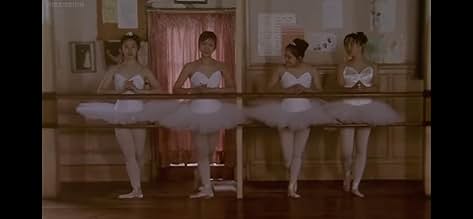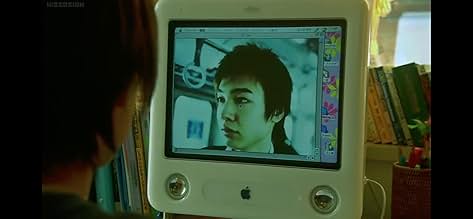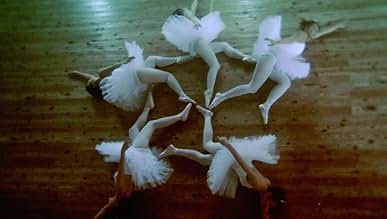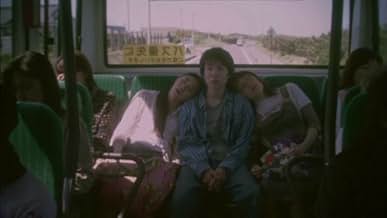AVALIAÇÃO DA IMDb
7,2/10
5,2 mil
SUA AVALIAÇÃO
Quando duas melhores amigas começam a gostar de um mesmo garoto, elas planejam um plano para faze-lo sair com elas.Quando duas melhores amigas começam a gostar de um mesmo garoto, elas planejam um plano para faze-lo sair com elas.Quando duas melhores amigas começam a gostar de um mesmo garoto, elas planejam um plano para faze-lo sair com elas.
- Direção
- Roteirista
- Artistas
- Prêmios
- 1 vitória no total
Avaliações em destaque
Near the end of Mike Leigh's Vera Drake (trivial spoiler about Vera Drake but not about Hana and
), Imelda Staunton's Vera stands accused, caught, guilty. For what seems an eternity of fictional if not real time, before an ever-expanding body of those-who-know, she displays, in her eyes and quivery cheeks and chin, her shame. Shame's a fluid thing, grows, changes as one's conscience, if that's what it is, reaches about for new embarrassment on which to feed, and so is Vera's face in these scenes ever-changing. Time races, falls with a dreadful weight, but at the same instant it stops dead. Such embarrassments eventually slip our minds. Everyday rote erases them. We banish, delete, forget them, as well as we can, but they never exactly end. Each moment itself is something like eternal.
Elsewhere I've remarked the map-ability of Iwai's films: Uchiage hanabi, shita kara Miruka? Yoko kara Miruka? (1993) with both it's title conundrum and the on-the-road debarkation point for the alternate endings; April Story with its out-of-place fly casting; Love Letter in which doppelganger heroines overlap in space but never meet; Picnic whose protagonists walk the top edge of a wall that miraculously traverses their city; Yentown where the map one lives represents one's caste. Lily Chou Chou I haven't found time yet to re-watch and digest, but its characters travel, both locally and afar to that "Disney Jungle Ride" bit, and its concert throng near the end moves in a single direction that killer moves against. Motion needs map-able space. Iwai playing a film "director," in Hideyaki Anno's Ritual, walks/strolls/travels into and through the story and the maybe-mad girl's space. Undo has none of this. You hardly know where one set is in relation to another, as if linear space has collapsed into Moemi's bindings.
In Hana and Alice as in Undo, only the protagonists connect sets: trains, school, parkland, dance floor, etc. If anything in it is map-able, it's the two girls', and deadpan Miyamoto's, faces. Whether she's scheming, at a loss, or caught, Hana's face quivers with unceasing thought, at least as credibly and no less momentously than Vera caught. Like many liars, Hana thinks too much. She hasn't mastered yet the art of not thinking, seems not to realize the ease and simplicity of truth-telling. We see, much more often than hear, what Hana is thinking. Though the film's full of music, Hana's pre-verbal, or anti-verbal, thoughts reach us as if in dead silence, in what sounds like silent-film silence. Iwai's camera and his choice of close-ups of both girls suggest he knows this. I imagine Iwai cast Suzuki as Hana because of this silent ability. She'd displayed it to less merit in Returner. Aoi plays Alice less externally, or at least less facially. (My terminology's confusing. Alice is more of an introvert, perhaps, so uses body language which is external. But her face, early on, reveals less.) Note her mime-like dance in the animal suit: She slowly, magically reenters Hana's and our perception. At first Hana and we, for Hana, don't know whether to be annoyed. Is it one of those annoying stalking mimes? Is it sane?
Besides in faces, map Hana and Alice in Time. Amnesia's about losing Time, time already used, already spent, used up, gone, and so wasted if not remembered. The plot's machinations, Miyamoto's beyond-belief credibility, his in and out, on and off belief in the branchings of Hana's out-of-control lie, bend Time. Hana hands him a past, a chunk of time, then implicates Alice in yet another. Riding Hana's materialized daydream, Miyamoto travels to and fro, back and fore, but not in space. Hana and Alice is Iwai's La jetée.
But guess what! The film is hilarious. I can't think offhand of another film as simultaneously pictorial, euphonious, and simply funny. The humor is anything but situational. It has the warming reality of the everyday, of things and people we all know, because it transpires in the two girls cheeks, brows, and eyes.
There was a temptation to call H & A All About Lily Chou Chou's light antithesis. I don't feel that, choose not to. For touch points, besides La jetée and silent film, look maybe to Shakespeare's comedies, maybe even to his noisome clowns.
Elsewhere I've remarked the map-ability of Iwai's films: Uchiage hanabi, shita kara Miruka? Yoko kara Miruka? (1993) with both it's title conundrum and the on-the-road debarkation point for the alternate endings; April Story with its out-of-place fly casting; Love Letter in which doppelganger heroines overlap in space but never meet; Picnic whose protagonists walk the top edge of a wall that miraculously traverses their city; Yentown where the map one lives represents one's caste. Lily Chou Chou I haven't found time yet to re-watch and digest, but its characters travel, both locally and afar to that "Disney Jungle Ride" bit, and its concert throng near the end moves in a single direction that killer moves against. Motion needs map-able space. Iwai playing a film "director," in Hideyaki Anno's Ritual, walks/strolls/travels into and through the story and the maybe-mad girl's space. Undo has none of this. You hardly know where one set is in relation to another, as if linear space has collapsed into Moemi's bindings.
In Hana and Alice as in Undo, only the protagonists connect sets: trains, school, parkland, dance floor, etc. If anything in it is map-able, it's the two girls', and deadpan Miyamoto's, faces. Whether she's scheming, at a loss, or caught, Hana's face quivers with unceasing thought, at least as credibly and no less momentously than Vera caught. Like many liars, Hana thinks too much. She hasn't mastered yet the art of not thinking, seems not to realize the ease and simplicity of truth-telling. We see, much more often than hear, what Hana is thinking. Though the film's full of music, Hana's pre-verbal, or anti-verbal, thoughts reach us as if in dead silence, in what sounds like silent-film silence. Iwai's camera and his choice of close-ups of both girls suggest he knows this. I imagine Iwai cast Suzuki as Hana because of this silent ability. She'd displayed it to less merit in Returner. Aoi plays Alice less externally, or at least less facially. (My terminology's confusing. Alice is more of an introvert, perhaps, so uses body language which is external. But her face, early on, reveals less.) Note her mime-like dance in the animal suit: She slowly, magically reenters Hana's and our perception. At first Hana and we, for Hana, don't know whether to be annoyed. Is it one of those annoying stalking mimes? Is it sane?
Besides in faces, map Hana and Alice in Time. Amnesia's about losing Time, time already used, already spent, used up, gone, and so wasted if not remembered. The plot's machinations, Miyamoto's beyond-belief credibility, his in and out, on and off belief in the branchings of Hana's out-of-control lie, bend Time. Hana hands him a past, a chunk of time, then implicates Alice in yet another. Riding Hana's materialized daydream, Miyamoto travels to and fro, back and fore, but not in space. Hana and Alice is Iwai's La jetée.
But guess what! The film is hilarious. I can't think offhand of another film as simultaneously pictorial, euphonious, and simply funny. The humor is anything but situational. It has the warming reality of the everyday, of things and people we all know, because it transpires in the two girls cheeks, brows, and eyes.
There was a temptation to call H & A All About Lily Chou Chou's light antithesis. I don't feel that, choose not to. For touch points, besides La jetée and silent film, look maybe to Shakespeare's comedies, maybe even to his noisome clowns.
2 teenage girls who are best friends are into the same boy ... Coming from Hollywood such a movie would be shallow for sure, in the style of numerous other high school comedies. Japanese director Shunji Iwai, however, managed to make a movie out of this material which has a lot of depth, a movie that is rich of subtle, moving moments. Rather than showing a simple love story, the focus of the movie is clearly the two girls and their friendship, and how it is being put on the test. Hana and Alice are simply adoring when they quickly come up with another hilarious lie to back up each others made up stories. On the other hand, their love interest is slow and passive most of the time, it seems like he is sleepwalking at times. Unlike Hollywood movies it's a lot about the unsaid, and be prepared that not everything is explained. The film never becomes sentimental nor too heavy, because the drama is lightened up with quite a bit of humor. A very watchable movie indeed ...
Hana and Alice are best friends about to enter high school. One day, they see Masashi, a boy about their age, on board a train. Alice develops a crush on him, though it is but a passing fad. For Hana, it is something more serious, and she begins to shadow Masashi, determined to make him her boyfriend. After he has an accident, Hana convinces him he has amnesia, and has forgotten that they are a couple. Matters are complicated further when Hana makes Alice pretend to be his ex-girlfriend; and further still when Alice and Masashi fall for each other. In the face of such drama, can Hana and Alice's friendship last?
Subtle and moving, Shunji Iwai's 'Hana and Alice' is a deceptively simple comic-drama speaking depths about the human condition. It is a striking picture, the subtly strong narrative of which is all the more incredible when one considers it began life as four short films celebrating the 30th anniversary of Nestlé's Kit Kat chocolate bar in Japan. A poignant character study, examining the personalities of two complex girls, Iwai's characterisation is rich and full of depth.
Both Hana and Alice are multifaceted, layered characters, with ambitions, faults and secrets. Though not immoral or unempathetic, they are not above using others to get their own way. Through Iwai's nuanced storytelling, a vividly realistic portrayal of these two characters is created. Manipulative, but charming, they are compelling, realistic cinematic creations, with fascinating backstories; and their tale is engaging.
Throughout the film, their friendship is put to the test. Iwai uses them to make a larger point about the importance of friendship, especially during one's formative years. He also delves into the complexities of youth, displaying great insight into the adolescent mindset. Hana and Alice are on the cusp of adulthood, a strange time when one re-examines one's life, readjusting priorities. Both Hana and Alice struggle; trying to act like adults, while suffering from a dearth of positive role models.
Alice's mother is far too concerned with her own romantic entanglements, while her father is distant and awkward. Hana's mother, meanwhile, seems disconnected from her daughter, focused on her work. At one point, she addresses Masashi as Hana, seemingly not recognising that he isn't, in fact, her daughter. It is no wonder that Hana and Alice create fabulous lies when they have no-one offering them guidance.
It is an affecting picture, not to mention a funny one. Iwai's dialogue is witty and many sequences will have viewers- possessed of a certain sense of humour- grinning from ear to ear. Additionally, it is a strikingly shot film, containing artful cinematography from Noboru Shinoda. His muted work is couched in the traditions of realism, yet has a certain stylized edge to it. It is as if the film were shot as a reflection of life in a carnival hall of mirrors; visuals projecting a slightly heightened version of reality, carrying much emotional weight.
The mournful score, from Iwai himself, doesn't just complement these visuals; it heightens them, compounding their dramatic power. Further, it is well-edited film, with Iwai establishing a steady pace from the beginning. Although some criticise it as being overlong, even at two hours and fifteen minutes, in the company of Hana and Alice, time flies.
Anne Suzuki and Yu Aoi star as Hana and Alice, respectively, delivering two remarkable performances of depth, wit and nuance. Whether delivering impassioned monologues- as Suzuki does masterfully in the latter half- or performing ballet- like Aoi, beautifully, in the last act- both of them impress greatly. They'll have you laughing and crying in equal measure. Alongside them, Tomohiro Kaku does fine work as Masashi, while Sei Hiraizumi is great as Alice's father, in a solitary- but memorable- scene.
A compelling character study, Shunji Iwai's 'Hana and Alice' offers viewers a profound meditation on the complexities of youth, friendship and love. Funny and sad both, its narrative- and the characters involved- are engaging, while the cinematography and score are memorably striking. Strongly acted- especially by stars Anne Suzuki and Yu Aoi- it is a heartfelt and heartrending comic-drama that is well worth a watch.
Subtle and moving, Shunji Iwai's 'Hana and Alice' is a deceptively simple comic-drama speaking depths about the human condition. It is a striking picture, the subtly strong narrative of which is all the more incredible when one considers it began life as four short films celebrating the 30th anniversary of Nestlé's Kit Kat chocolate bar in Japan. A poignant character study, examining the personalities of two complex girls, Iwai's characterisation is rich and full of depth.
Both Hana and Alice are multifaceted, layered characters, with ambitions, faults and secrets. Though not immoral or unempathetic, they are not above using others to get their own way. Through Iwai's nuanced storytelling, a vividly realistic portrayal of these two characters is created. Manipulative, but charming, they are compelling, realistic cinematic creations, with fascinating backstories; and their tale is engaging.
Throughout the film, their friendship is put to the test. Iwai uses them to make a larger point about the importance of friendship, especially during one's formative years. He also delves into the complexities of youth, displaying great insight into the adolescent mindset. Hana and Alice are on the cusp of adulthood, a strange time when one re-examines one's life, readjusting priorities. Both Hana and Alice struggle; trying to act like adults, while suffering from a dearth of positive role models.
Alice's mother is far too concerned with her own romantic entanglements, while her father is distant and awkward. Hana's mother, meanwhile, seems disconnected from her daughter, focused on her work. At one point, she addresses Masashi as Hana, seemingly not recognising that he isn't, in fact, her daughter. It is no wonder that Hana and Alice create fabulous lies when they have no-one offering them guidance.
It is an affecting picture, not to mention a funny one. Iwai's dialogue is witty and many sequences will have viewers- possessed of a certain sense of humour- grinning from ear to ear. Additionally, it is a strikingly shot film, containing artful cinematography from Noboru Shinoda. His muted work is couched in the traditions of realism, yet has a certain stylized edge to it. It is as if the film were shot as a reflection of life in a carnival hall of mirrors; visuals projecting a slightly heightened version of reality, carrying much emotional weight.
The mournful score, from Iwai himself, doesn't just complement these visuals; it heightens them, compounding their dramatic power. Further, it is well-edited film, with Iwai establishing a steady pace from the beginning. Although some criticise it as being overlong, even at two hours and fifteen minutes, in the company of Hana and Alice, time flies.
Anne Suzuki and Yu Aoi star as Hana and Alice, respectively, delivering two remarkable performances of depth, wit and nuance. Whether delivering impassioned monologues- as Suzuki does masterfully in the latter half- or performing ballet- like Aoi, beautifully, in the last act- both of them impress greatly. They'll have you laughing and crying in equal measure. Alongside them, Tomohiro Kaku does fine work as Masashi, while Sei Hiraizumi is great as Alice's father, in a solitary- but memorable- scene.
A compelling character study, Shunji Iwai's 'Hana and Alice' offers viewers a profound meditation on the complexities of youth, friendship and love. Funny and sad both, its narrative- and the characters involved- are engaging, while the cinematography and score are memorably striking. Strongly acted- especially by stars Anne Suzuki and Yu Aoi- it is a heartfelt and heartrending comic-drama that is well worth a watch.
The base layer here is teenage romance tweaked a little to frame episodes of ordinary life. Two schoolgirls fall in love with an aloof boy who believes he suffers from amnesia.
Annotating this is Celine and Julie Go Boating, which was about two girls embarking upon dreamlike adventure and mischief around modern Paris. What was so remarkable about it were precisely the elusive controls: the film didn't give out that we were, in fact, daydreaming until we were too far in to know exactly where. The clue was already laid out in the first scene, a cat of mysterious eyes and a peculiar chase through empty streets.
So you will have to pay attention to the opening scenes of Iwai's film, echoing this. Once again a chase in and out of subway cars as giggly play between the two girls. The other clue is obvious enough: Alice.
This layer borrows Rivette's whimsical light structure. Roles, guises, fiction, synchronous games about the fabrication of narratives, in our case centered at this boy who remembers nothing, is empty space, a blank stage, and the plays the girls assemble around him. He's told he was in love with one, then both. They both act parts, fashion entire pasts and emotions.
So love as this game of fiction, and getting to allow to be seduced by an image. This is excellent work, and in how it's subtly acknowledged inside the film: one girl signs up for a drama class, and has in fact done so to be close to the boy, himself an actor, the other is randomly approached on the street to model for TV commercials - and this may well reference Mikio Naruse's wonderful Street without Return from '34.
So the third layer is how the play is going to be resolved on a level behind the base narrative of ordinary life, and into the stage where love is the heightened game of duplicity.
One ploy is simple enough, opening day for the school play both girl and boy were rehearsing and a near-perfect rendition of the mechanisms that give rise to images: out on the stage performance, roles, fiction consumed as real, and backstage the internal machinations of tortured soul. The other is a little more intricate because of how unassuming: Alice auditions for a part in TV commercial.
Now so far this is no different than a French film. Notice what Iwai does, an extra layer that is deeply Japanese. Now the Japanese idea of high beauty and by extension performance, what is often perceived as quaint reticence, is formless heart expressed in visible form. Meditation.
But even a patriarch of Chan like Hongren could not so simply gauge his pupils' inner heart when the time came to decide for a succesor. What he asked instead, was that they write poems on a wall about it. This is a frequent practice in Buddhism. Painting a cycle will do, an 'ensho' meaning awareness. The hand will tell.
Now all through the film Hana has secretly contrived to cling to her object of desire, has lied and deceived. But when it comes to expressing inner self, we note that she is, in fact, a bad actress. Iwai intercuts her melodramatic reactions backstage with the actor's mock-mannerisms out on the stage. The auditorium is empty when she finally gets out for her part.
On the other hand Alice. She has been part of the ploy but with a certain affection for the part and with genuine feelings. So much so that it slipped from her, a bad actress in terms of the conventional drama of the world. We trust however that even though the image is false, she's moved to it truthfully. Her audition is to play an image on a screen. Instead the director decides on a whim that he wants her to do a ballet dance as per her resume, and in a short skirt, an almost humiliating prospect. What does she do? Channeling true self into the thing, she amazes with her skills.
So what do we get, between these two girls? Flowers in the sky, Hana meaning flower, reflecting Zen Master Dogen's notions of illusory mind images.
And on the other hand, the subtlest difference. Emptiness in full bloom. Or in the words of Dogen: being one with just this, while being free from just this.
Something to meditate upon.
Annotating this is Celine and Julie Go Boating, which was about two girls embarking upon dreamlike adventure and mischief around modern Paris. What was so remarkable about it were precisely the elusive controls: the film didn't give out that we were, in fact, daydreaming until we were too far in to know exactly where. The clue was already laid out in the first scene, a cat of mysterious eyes and a peculiar chase through empty streets.
So you will have to pay attention to the opening scenes of Iwai's film, echoing this. Once again a chase in and out of subway cars as giggly play between the two girls. The other clue is obvious enough: Alice.
This layer borrows Rivette's whimsical light structure. Roles, guises, fiction, synchronous games about the fabrication of narratives, in our case centered at this boy who remembers nothing, is empty space, a blank stage, and the plays the girls assemble around him. He's told he was in love with one, then both. They both act parts, fashion entire pasts and emotions.
So love as this game of fiction, and getting to allow to be seduced by an image. This is excellent work, and in how it's subtly acknowledged inside the film: one girl signs up for a drama class, and has in fact done so to be close to the boy, himself an actor, the other is randomly approached on the street to model for TV commercials - and this may well reference Mikio Naruse's wonderful Street without Return from '34.
So the third layer is how the play is going to be resolved on a level behind the base narrative of ordinary life, and into the stage where love is the heightened game of duplicity.
One ploy is simple enough, opening day for the school play both girl and boy were rehearsing and a near-perfect rendition of the mechanisms that give rise to images: out on the stage performance, roles, fiction consumed as real, and backstage the internal machinations of tortured soul. The other is a little more intricate because of how unassuming: Alice auditions for a part in TV commercial.
Now so far this is no different than a French film. Notice what Iwai does, an extra layer that is deeply Japanese. Now the Japanese idea of high beauty and by extension performance, what is often perceived as quaint reticence, is formless heart expressed in visible form. Meditation.
But even a patriarch of Chan like Hongren could not so simply gauge his pupils' inner heart when the time came to decide for a succesor. What he asked instead, was that they write poems on a wall about it. This is a frequent practice in Buddhism. Painting a cycle will do, an 'ensho' meaning awareness. The hand will tell.
Now all through the film Hana has secretly contrived to cling to her object of desire, has lied and deceived. But when it comes to expressing inner self, we note that she is, in fact, a bad actress. Iwai intercuts her melodramatic reactions backstage with the actor's mock-mannerisms out on the stage. The auditorium is empty when she finally gets out for her part.
On the other hand Alice. She has been part of the ploy but with a certain affection for the part and with genuine feelings. So much so that it slipped from her, a bad actress in terms of the conventional drama of the world. We trust however that even though the image is false, she's moved to it truthfully. Her audition is to play an image on a screen. Instead the director decides on a whim that he wants her to do a ballet dance as per her resume, and in a short skirt, an almost humiliating prospect. What does she do? Channeling true self into the thing, she amazes with her skills.
So what do we get, between these two girls? Flowers in the sky, Hana meaning flower, reflecting Zen Master Dogen's notions of illusory mind images.
And on the other hand, the subtlest difference. Emptiness in full bloom. Or in the words of Dogen: being one with just this, while being free from just this.
Something to meditate upon.
Hana and Alice are good friends and they do everything together. They go to the same high school and they go to school together. One day Hana falls in love with a boy who goes to the same high school. Hana deceives the boy and gets him. However, the boy loves Alice and Alice also loves him. What will happen to the relationship of the three.
I have a lot of friends but I don't have friends like Hana and Alice. They are always together and they say everything each other. They look happy and I think it is good thing. However friends sometimes become rivals. In this movie, Hana and Alice love the same man and they become rivals each other. I think moderate distance is important. We can share glad feeling or sad experience with our friends, but not interfere deeply. By watching this movie, we can rethink about the relationships with our friends.
I have a lot of friends but I don't have friends like Hana and Alice. They are always together and they say everything each other. They look happy and I think it is good thing. However friends sometimes become rivals. In this movie, Hana and Alice love the same man and they become rivals each other. I think moderate distance is important. We can share glad feeling or sad experience with our friends, but not interfere deeply. By watching this movie, we can rethink about the relationships with our friends.
Você sabia?
- CuriosidadesAlthough released almost 11 years before O Caso de Hana e Alice (2015), this movie actually serves as the sequel.
- Citações
Setsuko "Alice" Arisugawa: I saw 'Hannibal' on satellite last night.
Hana: So did I.
Setsuko "Alice" Arisugawa: I was scared.
Hana: Isn't he creepy?
Setsuko "Alice" Arisugawa: Yeah. Don't you think real people are scarier... than zombies and ghosts?
- ConexõesFeatures Horus: O Príncipe do Sol (1968)
Principais escolhas
Faça login para avaliar e ver a lista de recomendações personalizadas
- How long is Hana and Alice?Fornecido pela Alexa
Detalhes
Bilheteria
- Faturamento bruto mundial
- US$ 654.448
Contribua para esta página
Sugerir uma alteração ou adicionar conteúdo ausente
























